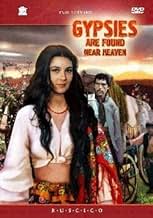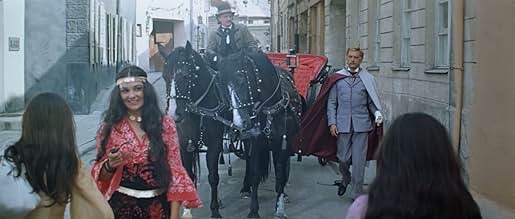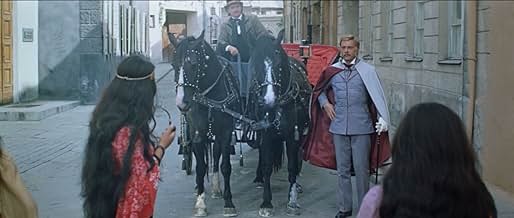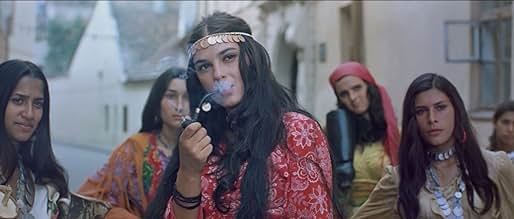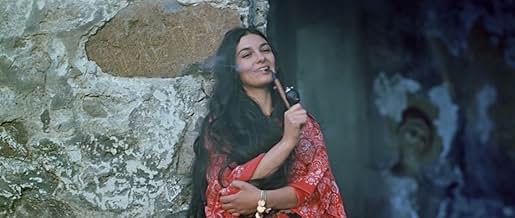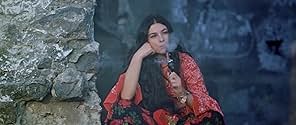NOTE IMDb
7,3/10
2 k
MA NOTE
Ajouter une intrigue dans votre langueRada, a beautiful and very proud gipsy girl is used to steal men's hearts and monk them. Zobar is a horse thief who's heart is stolen by Rada and his mind is bewitched. He is ready to give u... Tout lireRada, a beautiful and very proud gipsy girl is used to steal men's hearts and monk them. Zobar is a horse thief who's heart is stolen by Rada and his mind is bewitched. He is ready to give up his freedom but not his pride.Rada, a beautiful and very proud gipsy girl is used to steal men's hearts and monk them. Zobar is a horse thief who's heart is stolen by Rada and his mind is bewitched. He is ready to give up his freedom but not his pride.
- Réalisation
- Scénario
- Casting principal
- Récompenses
- 1 victoire et 1 nomination au total
Grigore Grigoriu
- Loiko Zobar
- (as Grigori Grigoriu)
Barasbi Mulayev
- Makar Chudra
- (as B. Mulayev)
Boryslav Brondukov
- Bucha
- (as Borislav Brondukov)
Vasyl Symchych
- Balint
- (as Vasili Simchich)
Avis à la une
I love this movie. It reminds me of my colorful childhood. The director was an amazing person and he is the pride of our country. The soundtrack composed by Eugen Doga are simply perfect. I have just one issue here. In the summary, there is a mistake that really bothers and
I would like to be fixed because it will confuse people that don't know anything about the history of Moldova. Bessarabia is not a part of Moldova. It is MOLDOVA. My country has two names - Moldova or Bessarabia. I know it's pretty messy and confusing, but that's how it is. I want proper information, regarding the movie.
Overall, I love to see the movies made in Eastern Europe are listed here.
I would like to be fixed because it will confuse people that don't know anything about the history of Moldova. Bessarabia is not a part of Moldova. It is MOLDOVA. My country has two names - Moldova or Bessarabia. I know it's pretty messy and confusing, but that's how it is. I want proper information, regarding the movie.
Overall, I love to see the movies made in Eastern Europe are listed here.
A movie that could only have been made in the 70s. Very free and very lyrical. Poetic but still very earnest with a touch of nudity. While nudity nowadays is not a big deal, I suppose it was back then (even through all the Flower Power movement). And therefor it got special mention before the screening (this year, 2010).
This shouldn't be the reason for you to watch the movie though. There is other movies out there ready to be explored, if you are looking for that kind of thing. This movie on the other hand, just lives the free spirit and does not take a particular road. Or tells a great story for that matter. It's all about humans and gypsies in general (though that might not be the political correct term to call them). And a promise the movie makes, that is kept in the end ... not that you did not see that coming ... just saying
This shouldn't be the reason for you to watch the movie though. There is other movies out there ready to be explored, if you are looking for that kind of thing. This movie on the other hand, just lives the free spirit and does not take a particular road. Or tells a great story for that matter. It's all about humans and gypsies in general (though that might not be the political correct term to call them). And a promise the movie makes, that is kept in the end ... not that you did not see that coming ... just saying
This movie is a sweet melodrama about the life and the customs of gypsies in the past century. One of the main aspects that one may consider before watching this movie is the soundtrack, which contains several gypsy songs (original, with Romany words) flavored with some masterpieces of the well known Moldavian soundtrack composer Eugen Doga.
Unlike other movies, this film marches deep into the past revealing a world completely unknown to most of the present day individuals, an almost ancient time when gypsies were just a tribe of ill-behaved, rebellious people wandering from one place to another. Everything is covered with a haze of magic and archaic. It was a time when killing and getting killed for a fistful of gold or a horse were the order of the day, when people believed in sorcery and magic. It was a time when the traditions perpetuated orally, when "a capella" singing (rarely aided by a background violin or guitar) rather than big-band Bregovic-like events was the way to express one's grief or happiness. Listen to "I am dying mother" or "Phabaj" to understand what I mean!
Essentially the script tells an uncommon and passionately love story between a horse thief, Zobar, and a young gypsy witch, Rada. The script is a little bit unpolished making the impression of a "pink novel", but the music and the images (not to mention the beauty & talent of Svetlana Toma) balance quite well the not so very thick plot.
9/10 - for picturing so well a world lost to the ravages of time.
Unlike other movies, this film marches deep into the past revealing a world completely unknown to most of the present day individuals, an almost ancient time when gypsies were just a tribe of ill-behaved, rebellious people wandering from one place to another. Everything is covered with a haze of magic and archaic. It was a time when killing and getting killed for a fistful of gold or a horse were the order of the day, when people believed in sorcery and magic. It was a time when the traditions perpetuated orally, when "a capella" singing (rarely aided by a background violin or guitar) rather than big-band Bregovic-like events was the way to express one's grief or happiness. Listen to "I am dying mother" or "Phabaj" to understand what I mean!
Essentially the script tells an uncommon and passionately love story between a horse thief, Zobar, and a young gypsy witch, Rada. The script is a little bit unpolished making the impression of a "pink novel", but the music and the images (not to mention the beauty & talent of Svetlana Toma) balance quite well the not so very thick plot.
9/10 - for picturing so well a world lost to the ravages of time.
This film, known as "Satra" - a group of wandering gypsies - to the Romanians is definitely worth viewing. Based on a short novel by Gorki, it gives a snapshot of Gypsy life in the Far-Eastern part of the Habsburg Empire. Nevertheless, the film is a bit diminished by its 1970s-Soviet origin: many badly played-back songs, a soundtrack that tends to give a hippy-70s flavors to the Gypsy songs. I'm not so enthusiastic about the work of the composer who rather spoiled the Gypsy music than improved it. In this domain, Goran Bregovici keeps the lead. The RUSCICO DVD edition includes some interesting bonus though not very enlightening. Notice that the script was refused by the Moldovan Film Studios so that it was shot by the Moscow film studios.
A poem about freedom and love. A strange world of joy, ambitions and desires. A form of escape and a colorful dream.
Emil Loteanu was a special director for the way chosen. His movies, products of Sovietic cinema, are, very often, touching skits of a raw cardboard's space. The stake- to prove the identity of a small nation in a empire. The means- Russian art of purlieus. Accent on the dramatic themes and emotions like only message.
"Tabor ukhodit v nebo" is only a picturesque film about a imaginary community. His importance is not small because the Gipsys are the product, in the self-image ,of this movie, slice of a possible golden age at the beginning of XXth century. In same time, it is a good introduction to Kusturica filmography, with the aspects of a ambiguous Balkan's life, with songs and carousals with barbarian persistent taste, with full of color atmosphere and any way of business.
So, a good film for Bovaric public, for the Kakania's nostalgics, for amateurs of subtle kitsch, for the fans of actors, for old Gipsys or dreamers. But, in fact,it is only a ethnographic foray in Maxim Gorki's pathetic universe. Eastern Europe- like a strange endless Gypsy's song.
Emil Loteanu was a special director for the way chosen. His movies, products of Sovietic cinema, are, very often, touching skits of a raw cardboard's space. The stake- to prove the identity of a small nation in a empire. The means- Russian art of purlieus. Accent on the dramatic themes and emotions like only message.
"Tabor ukhodit v nebo" is only a picturesque film about a imaginary community. His importance is not small because the Gipsys are the product, in the self-image ,of this movie, slice of a possible golden age at the beginning of XXth century. In same time, it is a good introduction to Kusturica filmography, with the aspects of a ambiguous Balkan's life, with songs and carousals with barbarian persistent taste, with full of color atmosphere and any way of business.
So, a good film for Bovaric public, for the Kakania's nostalgics, for amateurs of subtle kitsch, for the fans of actors, for old Gipsys or dreamers. But, in fact,it is only a ethnographic foray in Maxim Gorki's pathetic universe. Eastern Europe- like a strange endless Gypsy's song.
Le saviez-vous
- ConnexionsFeatured in Legendy mirovogo kino: Emil Loteanu
- Bandes originalesNane Tsokha
Performed by Alyona Buzylyova
Meilleurs choix
Connectez-vous pour évaluer et suivre la liste de favoris afin de recevoir des recommandations personnalisées
- How long is Queen of the Gypsies?Alimenté par Alexa
Détails
- Durée
- 1h 41min(101 min)
- Couleur
- Rapport de forme
- 2.20 : 1
Contribuer à cette page
Suggérer une modification ou ajouter du contenu manquant

